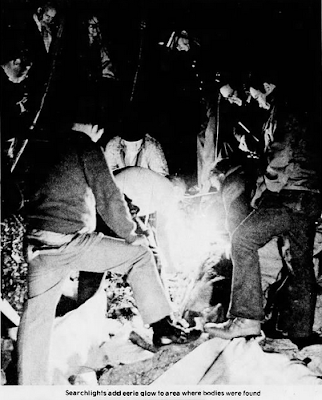Suicide of a German Fugitive
 |
| An old graveyard in Keating, PA |
On the morning of Wednesday, July 19, 1882, the little village of Keating in Clinton County was the scene of a strange suicide. The previous evening, two men had driven to Keating from Tioga County and had taken a room at the hotel owned by J.W. Merry. The driver was a young man who gave his name as Bush, while the other man gave his name as Carl Duhlmeyer, and listed his address as Verden, Germany.
After Duhlmeyer failled to make an appearance for breakfast the following morning, the proprietor of the hotel grew worried. At noon the man's room was entered and, to the shock of the hotel-keeper, Duhlmeyer was found dead of an apparent self-inflicted gunshot wound to the head. The German had left a note addressed his wife, along with $600 in gold and silver coins. The note directed his wife to keep half of the $600, and to give the remainder to two tobacco firms in Bremen, Germany. The note also contained the following cryptic remark:
I have been wrongfully accused. I could never stand it to be brought before a court of justice, and now have resolved to be my own judge.
But the mystery only deepened when the proprietor discovered that several thousand dollars worth of paper money had been burned in Duhlmeyer's washbowl.
So who was this mysterious lodger, and why had he incinerated such a large sum of money before putting a bullet in his own brain?
On April 2, three months earlier, the following article appeared in the German newspaper, the Hanover Kurier:
This morning, great excitement prevailed in government circles by the announcement of Carl Duhlmeyer's departure for parts unknown. Duhlmeyer, being district treasurer and having under him many clerks, who, as usual at the end of the quarter of a year, requested their pay, told them that the taxes of the different districts had not yet arrived, and therefore the salaries could not be paid until Monday, April 3. This morning, the discovery was made that all taxes came to the home office on March 31, and were received by the district treasurer.
The article in the German paper added that Duhlmeyer had fled Germany with 47,000 marks of his employees' salaries, along with another 34,000 marks belonging to the treasury. According to German authorities, Duhlmeyer had left Verden on a train for Hanover on March 31.
Of course, considering the facts of the case, it's unclear exactly how Duhlmeyer considered himself "wrongfully accused", unless his plan was to burn every trace of the stolen money and, as his last act on earth, write a misleading letter to his wife claiming that he was innocent.
At any rate, Duhlmeyer's body was taken to Lock Haven and buried in a pauper's grave, and the matter of his suicide was soon forgotten. However, it is fascinating to think about the devious German treasurer and his ill-fated flight from justice, which took him from Lower Saxony and across the Atlantic to a remote, tiny village in Clinton County.
Lebanon Daily News, July 20, 1882.
Altoona Tribune, July 27, 1882.
Philadelphia Inquirer, Sept. 6, 1882.


Comments
Post a Comment